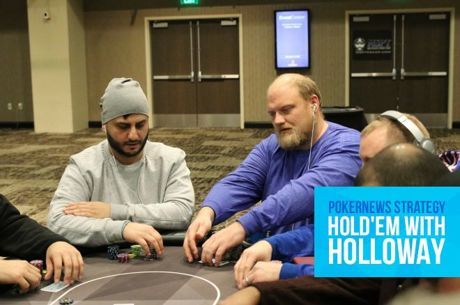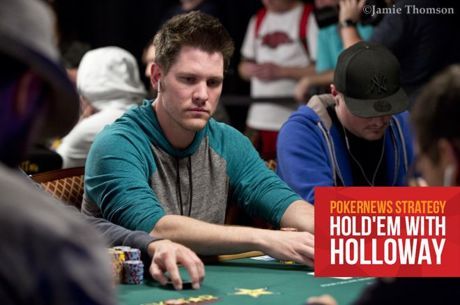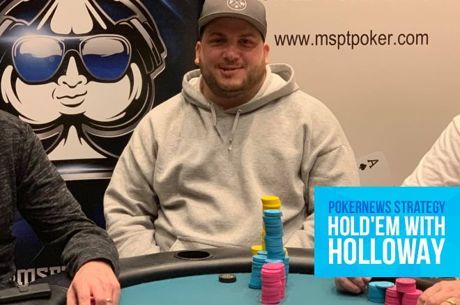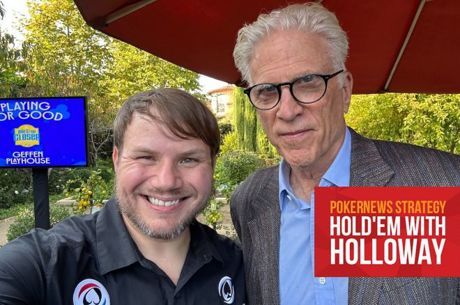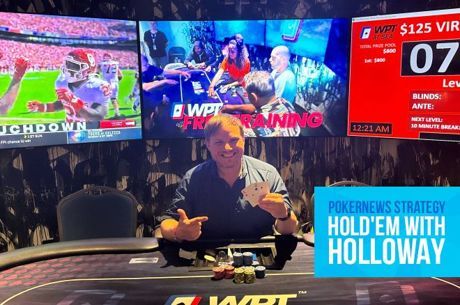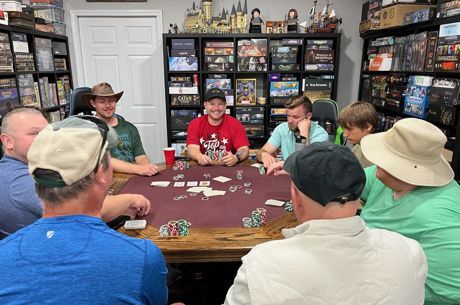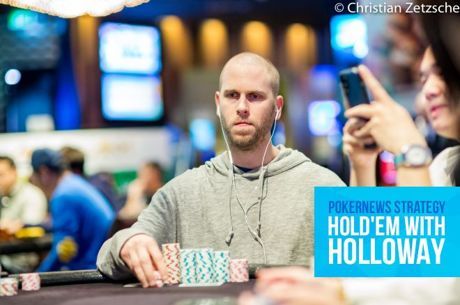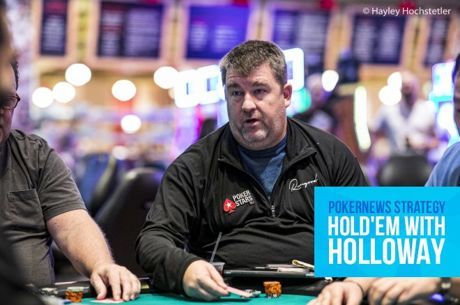Hold'em with Holloway, Vol. 91: Poker Lessons from a Game of Risk
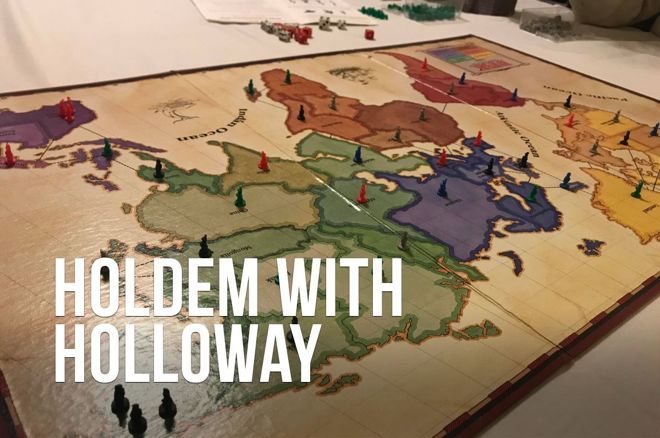
Table Of Contents
This past weekend, my group of friends opted to skip our usual poker home game in favor of a board game night. We played a throwback game of Risk, the game of global domination. I'm not exaggerating when I say 20 years ago or so we played it every night for the better part of a year.
I long ago gave up my global conquest dreams and swapped them for the pursuit of poker glory. Still, it was fun to play again, and I must admit I was surprised by the similarities I noticed between poker tournaments and Risk �� so much so that I decided to write about it in this week's column (Strange I know, but c'mon, I once wrote an article about which players were right vs. left handed).
Ideally, I'd have consulted 2015 World Series of Poker Main Event champ Joe McKeehen for this article. After all, he was the 2010 Risk World Champion after winning the Risk Annual Classic. I admit, though, I didn't ask him. That said, McKeehen did have some advice for me when I posted a picture of myself playing Risk on Facebook.
"Get an older one," he advised. "Armies, knights and cannons is sooooooooooo awful."
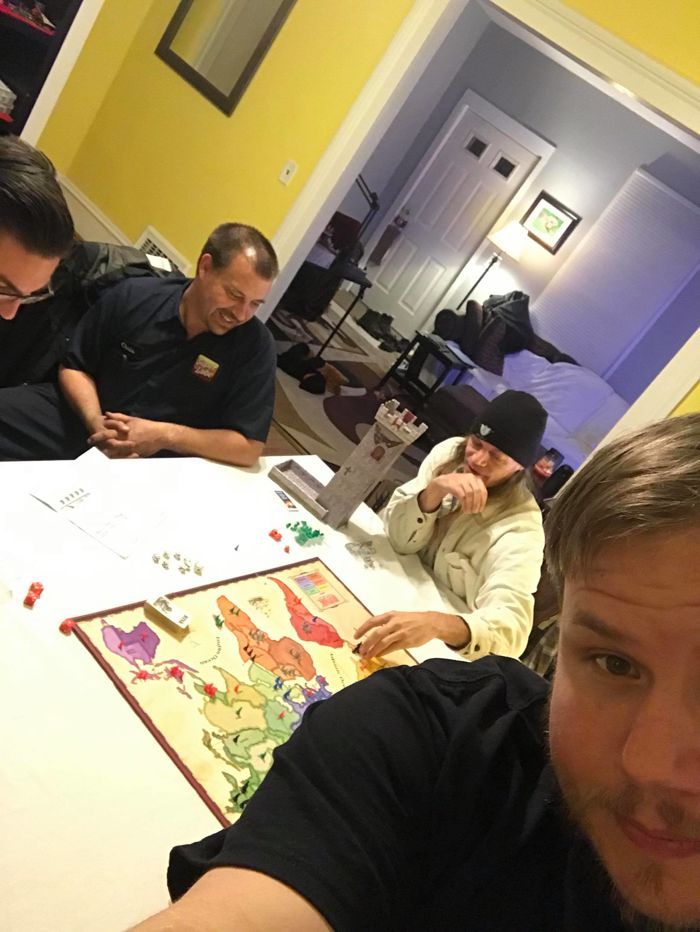
Like so many poker home game players do, we're prone to either make up our own rules or tweak others to the games we play. That's my disclaimer to any Risk purists out there who might want to say, "But that's not how it's played." It's how we've always done it as kids, so deal with it.
That said, here are some lessons I learned while playing risk that I realized also apply to poker.
Play the Cards You're Dealt
At the start of a Risk game, each player shakes a dice to determine who goes first. In our five-player game, that was me. In order to determine which countries we start with, we randomly assign them by taking turns drawing a country card. Luck would determine where we'd start.
Just like in poker where you have to make the best of the cards you're dealt, in our game of Risk you had to make the most of the randomized territories. Luckily, I was dealt a strong hand with five countries in the Asia-Pacific region. As any fan of Risk can tell you, having a foothold in Australia is a great way to start the game (for those wondering why, it's the easiest continent to control in the game).
The lesson learned is that there's no point in complaining about the cards, you just need to make the most of the deal. In Risk terms: When life deals you Kamchatka, load up your armies and head for Alaska.
Know Your Opponents
At a poker table you want to identify players who are prone to give you trouble. You want to figure out who plays fast and strong, and who exhibits constant aggression. On the flip side, you also want to find the weak and inexperienced players and attack.
In our game of Risk, my buddy Chris is a wild card. He's aggressive and will attack you for no other reason than you have too many countries, or armies. Like a LAG player in poker, I was going to avoid a big clash with Chris until I had the goods.
"This was a dynamic I had to be aware of and adjust my game accordingly."
Fortunately, Chris went for North America, which was on the opposite side of the board. I quickly wiped out his few lone soldiers in my neck of the woods to make an unpredictable attack highly improbable.
As the two most powerful armies on the board, we had an unspoken agreement to target the weaker players, not unlike two chip leaders staying out of each other's way until the end (which is what Chris and I ended up doing, by the way).
Pay Attention to Game Dynamics
In poker tournaments, blinds and antes continue to rise, which in turn forces the action. Similarly, in Risk players trade in cards for armies. The more cards traded in, the more armies are awarded. For example, the first player to trade in receives four extra armies, the second six armies, and the third eight armies, and so on. Eventually, trade-ins get as high as 50 armies, which results in big power swings.
Given I was first to act and players are required to trade in when they have five cards in their hand, I was going to be forced to trade in first, thus opening the door to my opponents receiving more armies. This was a dynamic I had to be aware of and adjust my game accordingly.
For me, it was similar to being near the money bubble with a shorter stack. I constantly had to pay attention to chip stacks and position (so to speak), lest I make a crucial mistake.
Pick Your Spots
"The strategies and lessons you learn in poker have far-reaching applications off the felt."
Given the above information, I quickly determined the only way for me to win the game of Risk was to make a move against an inexperienced player two to my left. He had five cards and would be required to trade in. However, I was first to act, traded in first, and prepared my armies for war. I was going to go all in on attacking him, and if successful, I would win his cards.
It's not unlike being in the cutoff with a shorter stack and having an even shorter stack in the big blind. You might just make a move to try and pick up those valuable chips.
In poker, knowing when to jam and against who is a critical skill. It's the same in Risk, when you must determine not only who to attack, but also have to find just the right time to do so.
Conclusion
I ended up winning our game of Risk by conquering the world, and it felt good. Not quite "winning a poker tournament" good, but good nonetheless. I couldn't help but feel that what I've learned in poker helped me clinch victory, and maybe that what I learned from Risk so many years ago helped me on my poker journey.
The strategies and lessons you learn in poker have far-reaching applications off the felt. Some apply to larger aspects of life, such as risk and bankroll management, while others can be used for something as lowly as a game of Risk.
In this Series
- 1 Hold��em with Holloway, Vol. 1: Making Reads and Trusting Them
- 2 Hold��em with Holloway, Vol. 2: Playing in Poker Charity Events
- 3 Hold��em with Holloway, Vol. 3: Throttle Back Before You End Up Punting
- 4 Hold��em with Holloway, Vol. 4: Punish the Satellite Bubble
- 5 Hold��em with Holloway, Vol. 5: What is Proper Accumulator Strategy?
- 6 Hold��em with Holloway, Vol. 6: A Chip and a Chair Story with ��SirWatts��
- 7 Hold��em with Holloway, Vol. 7: 15 Things About Poker I Wish I��d Known Sooner
- 8 Hold��em with Holloway, Vol. 8: Examining the Largest Overlay in Poker History
- 9 Hold��em with Holloway, Vol. 9: Differences Between Rebuys and Reentries
- 10 Hold��em with Holloway, Vol. 10: Five Must-Read Poker Books of 2014
- 11 Hold��em with Holloway, Vol. 11: When Will You Finally Break Through?
- 12 Hold��em with Holloway, Vol. 12: Dealing with a Target on Your Back
- 13 Hold��em with Holloway, Vol. 13: Knowing When to Call It Quits
- 14 Hold��em with Holloway, Vol. 14: Embarking on a Year-Long Weight Loss Journey
- 15 Hold��em with Holloway, Vol. 15: Navigating Multiple Decision Points in a Poker Hand
- 16 Hold��em with Holloway, Vol. 16: Chris Moorman Tells Me How Badly I Play Poker
- 17 Hold��em with Holloway, Vol. 17: Richard ��nutsinho�� Lyndaker on Getting It in Marginal
- 18 Hold��em with Holloway, Vol. 18: Getting Inside the Head of Poker Pro Brian Rast
- 19 Hold��em with Holloway, Vol. 19: Stupid Calls & Lucky Draws in MSPT WI Championship
- 20 Hold��em with Holloway, Vol. 20: Talking Ante-Only Strategy with Greg ��FossilMan�� Raymer
- 21 Hold��em with Holloway, Vol. 21: Contributing to Jonathan Little��s New Book
- 22 Hold��em with Holloway, Vol. 22: Consequences of Acting Out of Turn & Tossing in Chips
- 23 Hold��em with Holloway, Vol. 23: When It Comes to Chops, Do What��s In Your Best Interest
- 24 Hold��em with Holloway, Vol. 24: Accepting Bad Beats & Lessons in Selling Action
- 25 Hold��em with Holloway, Vol. 25: Heinz�� Ace-High Call Shows Why He's a World Champ
- 26 Hold��em with Holloway, Vol. 26: Is Keeping the Short Stack Alive Collusion?
- 27 Hold��em with Holloway, Vol. 27: Great Laydown or Bad Fold on Poker Night in America?
- 28 Hold��em with Holloway, Vol. 28: Calling Hellmuth with Jack-Deuce Offsuit
- 29 Hold��em with Holloway, Vol. 29: The Philosophy of "No-Chop" Chad
- 30 Hold��em with Holloway, Vol. 30: Preparing to Play the World Series of Poker
- 31 Hold��em with Holloway, Vol. 31: Staying on Your Grind at the World Series of Poker
- 32 Hold��em with Holloway, Vol. 32: The Perilous Decision to Call Off with Ace-Queen
- 33 Hold��em with Holloway, Vol. 33: Using Poker Skills in Reality TV Competitions
- 34 Hold��em with Holloway, Vol. 34: Esfandiari Explains How to Recover from Bad Beats
- 35 Hold��em with Holloway, Vol. 35: Tilly vs. Brunson in Super High Roller Cash Game Hand
- 36 Hold��em with Holloway, Vol 36: Unconventional Play Leads to Good WSOP Main Event Start
- 37 Hold��em with Holloway, Vol. 37: Lessons in Pot-Limit Omaha Hi-Low w/ Evan Jarvis
- 38 Hold��em with Holloway, Vol. 38: Things to Say and Do When You Bust a Poker Tournament
- 39 Hold��em with Holloway, Vol. 39: How Much Did I Have to Raise to Get You to Fold?
- 40 Hold��em with Holloway, Vol. 40: Practicing Patience in My Deep PPC Poker Tour Run
- 41 Hold��em with Holloway, Vol. 41: Analyzing a Questionable SHRPO Main Event Hand
- 42 Hold��em with Holloway, Vol. 42: Analyzing the Play of Neymar Jr. at EPT Barcelona
- 43 Hold��em with Holloway, Vol. 43: The Value of a Reliable Poker Reputation
- 44 Hold��em with Holloway, Vol. 44: John ��KasinoKrime�� Beauprez Rips My PLO Game Apart
- 45 Hold��em with Holloway, Vol. 45: Satellite Dilemmas -- To Call or Not to Call
- 46 Hold��em with Holloway, Vol. 46: Seiver Leverages the River in Super High Roller Bowl
- 47 Hold��em with Holloway, Vol. 47: What Untraditional Moves in Poker Might Mean
- 48 Hold��em with Holloway, Vol. 48: Thinking About the Future with Sam Grizzle
- 49 Hold��em with Holloway, Vol. 49: WCOOP Champ ��Coenaldinho7�� Offers Up His Biggest Hands
- 50 Hold��em with Holloway, Vol. 50: The Peril of Shoving Weak Aces
- 51 Hold��em with Holloway, Vol. 51: The Importance of Not Giving Up in Poker Tournaments
- 52 Hold��em with Holloway, Vol. 52: Does Asking ��Check�� Actually Constitute a Check?
- 53 Hold��em with Holloway, Vol. 53: Thomas Cannuli Impresses Even After Main Event Bustout
- 54 Hold��em with Holloway, Vol. 54: Dealers Aren��t Always Right
- 55 Hold��em with Holloway, Vol. 55: Don��t Get Married to Pocket Aces
- 56 Hold��em with Holloway, Vol. 56: Bazeley��s Survival Instinct Leads to Continued Success
- 57 Hold��em with Holloway, Vol. 57: Playing ��Deuces Wild�� on the European Poker Tour
- 58 Hold��em with Holloway, Vol. 58: The Wildest Hand in European Poker Tour History
- 59 Hold��em with Holloway, Vol. 59: Death, Zombies & Spending Time w/Phil Hellmuth
- 60 Hold��em with Holloway, Vol. 60: How the Unstoppable Fedor Holz Managed to Win Again
- 61 Hold��em with Holloway, Vol. 61: Lessons To Be Learned When You Hit the Big Stage
- 62 Hold��em with Holloway, Vol. 62: Steve O��Dwyer Explains the ��Oreo Cookie Tell��
- 63 Hold��em with Holloway, Vol. 63: What Would Happen to a Chip Stack If a November Niner Died?
- 64 Hold��em with Holloway, Vol. 64: Forgetting One Chip -- Should It Still Be an All-In Bet?
- 65 Hold��em with Holloway, Vol. 65: Todd ��sharkslayerrr�� Breyfogle on Bankroll Management
- 66 Hold��em with Holloway, Vol. 66: Cash Game Pro Daniel Arfin Offers Sound Bankroll Advice
- 67 Hold��em with Holloway, Vol. 67: Honeyman Plays Kings to Keep in Opponent��s Bluff Range
- 68 Hold��em with Holloway, Vol. 68: Why Do I Even Bother Drinking at the Poker Table?
- 69 Hold��em with Holloway, Vol. 69: Is Your Favorite Poker Pro Left- or Right-Handed?
- 70 Hold��em with Holloway, Vol. 70: In Order to Live You Have to Be Willing to Die
- 71 Hold��em with Holloway, Vol. 71: How to Amass a Big Stack Early in a Poker Tournament
- 72 Hold��em with Holloway, Vol. 72: Answering User-Submitted Poker Scenarios
- 73 Hold��em with Holloway, Vol. 73: Saying Goodbye with a Top Five List
- 74 Hold'em with Holloway, Vol. 74: We're Back, Baby!
- 75 Hold'em with Holloway, Vol. 75: Jivkov on Exploiting Capped Ranges
- 76 Hold��em with Holloway, Vol. 76: Matt Bretzfield Gets Tricky With Aces
- 77 Hold'em with Holloway, Vol. 77: Joseph Cheong Gets Crazy with a Pair of Ladies
- 78 Hold'em with Holloway, Vol. 78: Wyoming Poker Action & Wild South Dakota Hand
- 79 Hold'em with Holloway, Vol. 79: Calling Controversy at WinStar
- 80 Hold'em with Holloway, Vol. 80: Going for Value with Matt Hunt
- 81 Hold'em with Holloway, Vol. 81: Bracelet Winner Ryan Leng on Bad Call
- 82 Hold'em with Holloway, Vol. 82: Romeopro33 Recounts XL Eclipse Victory
- 83 Hold'em with Holloway, Vol. 83: Men The Master Doesn't Get Paid
- 84 Hold'em with Holloway, Vol. 84: Harman Hits Back-to-Back Miracle Turns
- 85 Hold'em with Holloway, Vol. 85: Jamie Kerstetter on Dealing with Bounties
- 86 Hold'em with Holloway, Vol. 86: Matt Stout Develops a Limp Dynamic
- 87 Hold'em with Holloway, Vol. 87: Matt Alexander Caught in Between w/ Two Red Aces
- 88 Hold'em with Holloway, Vol. 88: John Beauprez on Why He Folded a Set of Jacks
- 89 Hold'em with Holloway, Vol. 89: Alex Aqel Lets Opponent Hang Himself with Aces
- 90 Hold'em with Holloway, Vol. 90: David Peters Makes Beastly Call Against Will Givens
- 91 Hold'em with Holloway, Vol. 91: Poker Lessons from a Game of Risk
- 92 Hold'em with Holloway, Vol. 92: My Upstuck Diagnosis by the CLC Squad
- 93 Hold'em with Holloway, Vol. 93: Alex Foxen Coolers Nick Petrangelo in SHRB
- 94 Hold'em with Holloway, Vol. 94: My $25,000 PSPC Experience at 2019 PCA
- 95 Hold'em with Holloway, Vol. 95: The Equity of Leveraging Time Extensions
- 96 Hold'em with Holloway, Vol. 96: Dan O'Brien on Developing Healthy Routines
- 97 Hold'em with Holloway, Vol. 97: Big Hands From the WSOP-C Potawatomi
- 98 Hold'em with Holloway, Vol. 98: Simon Deadman Rips Apart My NLH Tourney Play
- 99 Hold'em with Holloway, Vol. 99: Shoving 10-6 Smack Dab Into Pocket Aces
- 100 Hold'em with Holloway, Vol. 100: The Revived Re-Entries Debate

